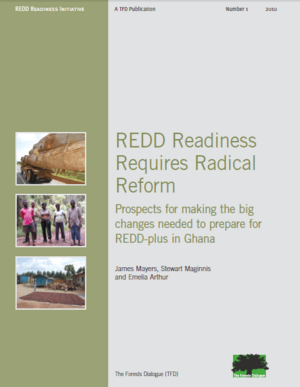REDD Readiness Requires Radical Reform
Forests may be about to get a lucky break. If opportunities are seized and problems ironed out, international mechanisms to support reduced emissions from deforestation and forest degradation and enhanced forest carbon stocks (“REDD-plus”) will give efforts to sustain forests and the livelihoods linked to them their best-ever chance of success. But preparations for making such mechanisms work on the ground have generally been unimpressive. Initiatives are needed to get REDD-plus protagonists from different contexts to work together on common challenges. In Ghana, some of the key building blocks are in place for REDD-plus and a vibrant debate on the issue is under way. The Forests Dialogue—an organization that fosters useful dialogue on tricky issues in forest conservation and use—offered to work with Ghanaian stakeholders and others to explore local and international insights and dilemmas that might help in Ghana’s REDD-plus preparations. Accordingly it convened an international REDD-plus readiness dialogue in Busua, Ghana in November 2009. The fundamental changes needed for sustainable forest management in Ghana have been known for years, and many large projects have been instigated accordingly. Yet real change has proved elusive. The key challenge now is to get REDD-plus right so that it makes a difference. Dialogue participants found that, at last, the time may be right for key improvements to be made. They also noted that Ghana has some key assets for moving forward on REDD-plus, including: an approved REDD-plus Readiness Preparation Proposal, which outlines proposed actions for REDD-plus and prepares the ground for a REDD-plus readiness plan; and a range of active government agencies and civil-society organizations.

